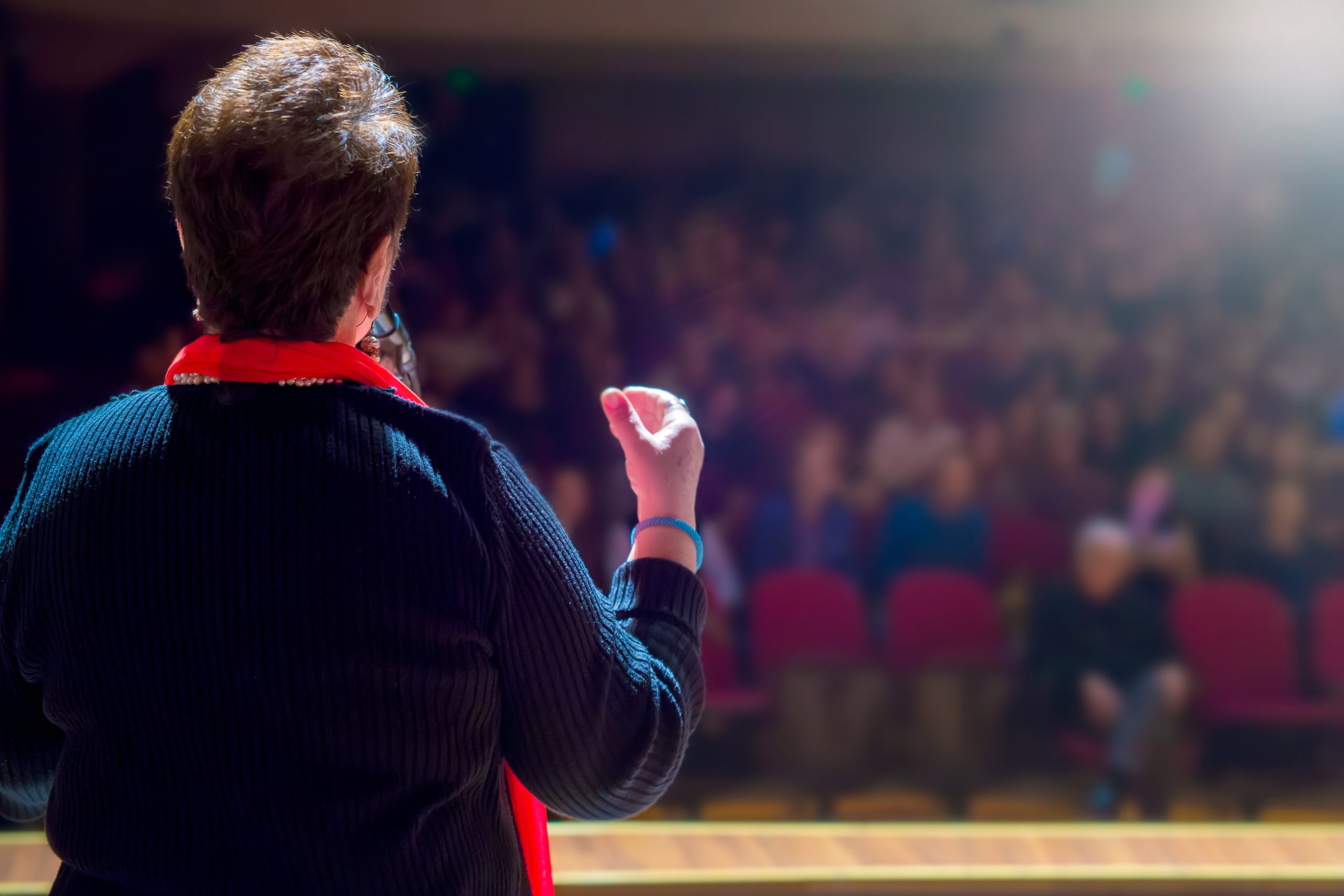Last week, schools closed and many of us transitioned to a work-from-home schedule. In the same week, I celebrated my three-year anniversary at Democracy Fund, where I lead the Constructive Politics portfolio. It felt ironic that while I was celebrating three years of supporting an approach to building a more inclusive America, one where everyone can feel like they belong and has a seat at the table, the country was asked to practice extreme levels of social distancing to prevent the spread of the COVID-19 virus.
Now, more than ever, I am sure many of us realize that feeling a sense of belonging requires a certain level of human interaction and connection. In fact, building connections with each other — through listening and learning in communities across the country — is the fundamental goal of the Constructive Politics portfolio. And even though we find ourselves in unusual times, Democracy Fund’s Constructive Politics grantees will continue to focus on developing long-term strategies that support opportunities for connecting, building, listening and work on creating more welcoming spaces to explore what unites us and help change the narrative of our national dialogue. We believe that long-term strategies to help foster an inclusive, multiethnic, multi-perspective democracy are key to defending and strengthening our political system. This couldn’t have been better exemplified by the current controversy around the U.S. government’s response to the coronavirus emergency.
While I believe our government has a key role to play, I have always believed that a heathy skepticism of institutional capacity to solve problems can be a good thing. Today, as I watch many Americans—including many of my friends—express skepticism about the government’s ability to respond effectively to this crisis, I feel somewhat validated in that belief. However, when healthy skepticism gives way to the deep distrust and polarization we see today, addressing division proactively is critical if we want to come up with effective solutions. This is as true for this crisis as it is for our work to mitigate polarization nationwide. From local politics to the highest levels of government, our inability to see our voices represented in our communities, policies, and institutions, fuels the distrust and polarization that is splitting our country apart. And this predicament is especially true for communities that have historically been underrepresented or outright excluded from participating in our system of government.
In late 2018, as former Speaker of the House Paul Ryan was finishing his last month in Congress, he shared some of his concerns about the extent to which polarization was weakening America’s institutions. In his 2018 analysis, Ryan asked: “How do you make inclusive, aspirational politics … strategically valuable? How do you make it so this is the winning thing, this is how you win elections?” Winning elections is certainly a powerful, perhaps the most powerful, incentive to embrace more inclusive politics, but the implications of his question reach beyond electoral politics.
Achieving the inclusive politics Ryan talks about requires a long-term commitment to building a truly inclusive democracy. In order to mitigate divisiveness and polarization, we must find ways to build bridges with our political leaders and institutions, as well as with each other. I’ve shared how elevating constructive voices, celebrating civility, and ensuring Congress looks more like America are important keys to achieving this goal. But trust is a very fragile construct. It takes time to develop and is very delicate to maintain. Strategies that aim to develop trust will take a long time, require experimentation, and will be equally difficult to scale. In part, this means that these strategies are high risk, full of uncertainty, and even after implementation they could take a long time to take root.
In spite of this uncertainty, at Democracy Fund, we’ve chosen to continue experimenting with approaches that tackle long-term challenges. We continue to believe that informed dialogue and principled compromise are essential to governing a large, diverse, and complex society like America. The COVID-19 pandemic plus the current climate of hyper-polarization continue to force us to focus on reactive strategies. Fortunately, we have partnered with social entrepreneurs who are rising to the challenge and experimenting with new ways to mitigate drivers of division over the long term. We have also chosen to partner across the political spectrum and especially with those on the right in this effort to create a more inclusive democracy.
The American Project on the Future of Conservatism at Pepperdine University, a multi-year program that brings together conservative leaders and scholars, has spent the last three years trying to assess divisions across the conservative movement with the goal of imagining its healthy future. The Project was one of the first Democracy Fund grantees to draw the connection between loneliness and polarization, calling for a renewed “Conservatism of Connection.” Conversations with conservative-leaning thought leaders since early 2017 have focused on how issues of loneliness, isolation, and lack of belonging appeared as the deeper engines of division within the conservative movement. These led to the development of the project’s Way Forward document and recommendations, and the creation of spaces for conservatives to continue to engage on issues around the future of the movement.
Since 2016, a growing number of organizations and movements are recalibrating their approaches to adopt new paths to consensus building. What these organizations have come to realize is that for people to feel like they belong, they must see themselves as co-creators of what the future of America will be. To this end, we are seeing organizations like The Inclusive Republic Series, an Aspen Socrates Program, and our Faith in Democracy cohort increasingly asking themselves how they can help build more inclusive policy making processes in the communities they work with.
Building meaningful connections across different communities is a necessary condition to reduce polarization, but this alone won’t be enough to solve the many policy challenges our country faces. From stopping the spread of Covid-19 to addressing climate change, Americans disagree profoundly on how to tackle these challenges. And even when there’s agreement, and decision makers buy into the proposed solutions, change is still hard. To tackle this challenge, organizations like Welcoming America are using the power of networks to identify more ways to create truly inclusive paths towards consensus building. Through innovative leadership development programs, Welcoming America leads a strategy aimed at making communities more prosperous by reinforcing their members’ sense of belonging.
Connecting with individuals who hold dramatically different views from the ones we are comfortable with requires a commitment to diversity of opinion, and, most importantly, a willingness to practice how to disagree constructively. The Better Arguments Project at the Aspen Institute was created to encourage Americans to engage with each other in better, more productive debates about core American ideals. In an era of deep divisions, the Better Arguments Project is based on the premise that American civic life doesn’t need fewer arguments; it needs better arguments.
Another grantee, Millennial Action Project, has been able to leverage their network of state legislators to create spaces for conversations among diverse community members with a spectrum of different perspectives through their Red and Blue Dialogues program. Along with members of their local State Future Caucuses, they’re bridging the divide to discuss the issues most important to young people across the country.
In addition, in an attempt to put the Constructive Politics Pluralism approach into practice, Democracy Fund has partnered with Welcoming America and the Better Arguments Project to bring together thought leaders interested in addressing root causes of polarization. We were able to co-create a space for collegial conversation that helped seed new ideas, relationships, and opportunities to address some of the complexities and challenges that we face in bridge building work. At the event last January, almost fifty grant makers representing different viewpoints came together under the auspices that creating a greater sense of we starts with us.
Make no mistake, this is hard work that requires a proactive long-term vision. One conversation at a time, our grantees are proving that making belonging everyone’s business inspires lasting change. By creating more welcoming spaces to explore what unites us, our grantees are working to change the nature of our national dialogue into a more inclusive one. I am grateful for their commitment to helping build a more inclusive America and a stronger democracy.
In this time of deep uncertainty, I’m reminded of what the future of a healthy democracy can look like if we build stronger bridges between people. As Eric Liu said recently, “the coronavirus may require us now to practice ‘social distancing’— but only in a physical, embodied sense. When it comes to the heart, the spirit, and the mind, coronavirus requires us more than ever before to practice civic love.”






